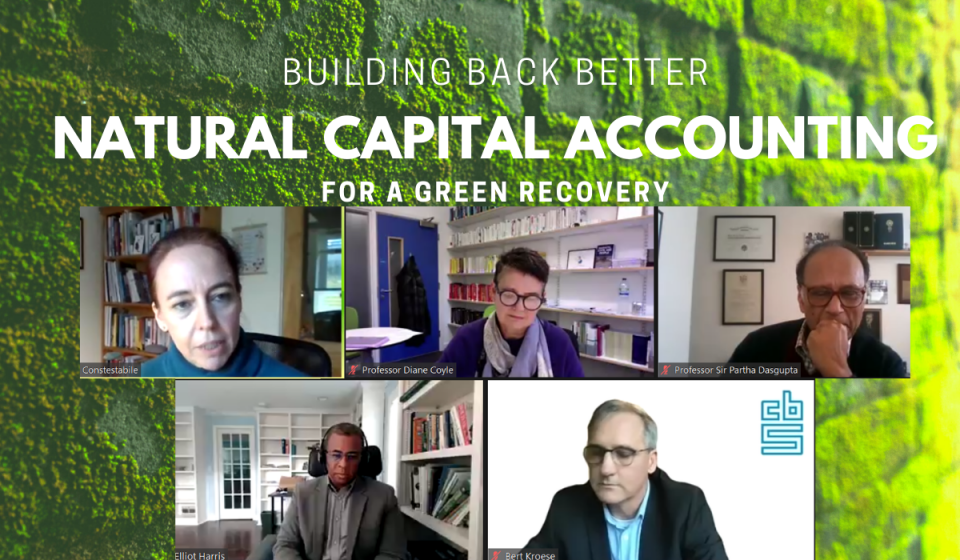Building Back Better: Natural Capital Accounting for a Green Recovery

The year 2020 has been unlike any other. Yet, as countries look towards 2021 and begin their recoveries from the pandemic, there is growing recognition that new measures are needed to move beyond GDP, and towards a system that considers all of humanity’s assets—natural, human, social and institutional. With this in mind, on 15 December 2020, hundreds of participants joined the webinar “Building Back Better: Natural Capital Accounting for a Green Recovery.”
The webinar, moderated by the editor of Nature Sustainability Dr. Monica Contestabile, brought together global experts to discuss the rationale for placing nature at the heart of the COVID-19 recovery. Multiple panelists, including UN Chief Economist Elliott Harris and Professor Diane Coyle at the University of Cambridge, pointed how we can learn from history and the recovery from WWII. The recovery from WWII was an economic recovery, one that relied on the System of National Accounts and GDP. However, today there is wide recognition that the same mindset and metrics cannot be relied upon again. As UN Chief Economist Elliott Harris pointed out: “Over time, we’ve concentrated on the economics. We’ve treated the economics as supreme…we assumed that if we got the economics right everything else would fall into place.” Yet, as the twin crises of climate change and biodiversity show us, there is an urgent need to change the tunnel vision thinking that got us here. To move past this siloed view, Mr. Harris pointed to the need for integrated statistics and natural capital accounting, as they can enable decisions that address all three pillars of the Sustainable Development Goals—the economy, environment and society.
Assistant Director-General of Statistics Netherlands and Chair of the UN Committee of Experts on Environmental-Economic Accounting, Bert Kroese emphasized: “To make integrated decisions, we need integrated data.” He pointed to his own country, the Netherlands as a good example. In the Netherlands, the government has collaborated with academia to use the SEEA to look at the economic and environmental trade-offs of using peatlands for dairy farming. Peatlands cover about 8 per cent of the land area of the Netherlands and are mainly used for dairy farming, including the famous Dutch Gouda cheese. But, as Mr. Kroese acknowledged, the greenhouse gas emissions from draining peatlands are enormous. Thus, the Netherlands used the SEEA carbon accounts to show that the profits from farming were smaller than the monetized costs of CO2 emissions and the related damages, which has resulted in incentivizing farmers to stop farming in peatlands.
Panelists also pointed to the importance of natural capital accounting and the SEEA in providing a much-needed future-oriented view. Not only do we need to have the environment and society taken into account, but it is equally important to focus on asset accounts as it is flow accounts. As Professor Sir Partha Dasgupta put it: “It is absolutely essential to have accounts for natural capital assets…the entire future is reflected in the assets you’ve got.” Professor Dasgupta pointed to the importance of communicating with decision makers on this point, who are often more used to flow accounts and GDP. In terms of driving this vision forward, Professor Diane Coyle pointed to the importance of the United Nations’ work in promoting natural capital accounting and the wealth approach, for example with the upcoming release of the revised SEEA Ecosystem Accounting. Professor Coyle further stressed the necessity of providing national statistical offices with the resources to compile the data.
Closing remarks were provided by Parliamentary Secretary for the Federal Ministry for Economic Cooperation and development of Germany, Mr. Norbert Barthle. Mr. Barthle emphasized the window of opportunity with the COVID-19 recovery: “We must not return to business as usual after COVID-19. We cannot afford the global economy that builds prosperity at the expense of the environment, the global climate and the wellbeing of millions of people and generations to come.” Moreover, he pointed out, “Policy makers around the world need to be aware that natural capital accounting is critical because it helps us to take better informed decisions.” He pointed to recent collaboration with the United Nations Statistics Division on that front, specifically the release of publications on the policy applications of the SEEA, including biodiversity, climate change and macroeconomic policy. Mr. Stefan Schweinfest, Director of the UN Statistics Division formally closed the event by emphasizing: “We are deeply convinced at the UN that the SEEA provides that much needed framework for integrating information systems.” The SEEA Ecosystem Accounting will be presented to the UN Statistical Commission in March 2021, with a view of providing policy makers with a standardized framework for integrating ecosystems and the environment.
A recording of the webinar, which was co-organized by the United Nations Department of Economic and Social Affairs the Bennett Institute for Public Policy at the University of Cambridge, and the Federal Ministry for Economic Cooperation and Development of Germany, can be found here: https://seea.un.org/events/building-back-better-natural-capital-accounting-green-recovery.
